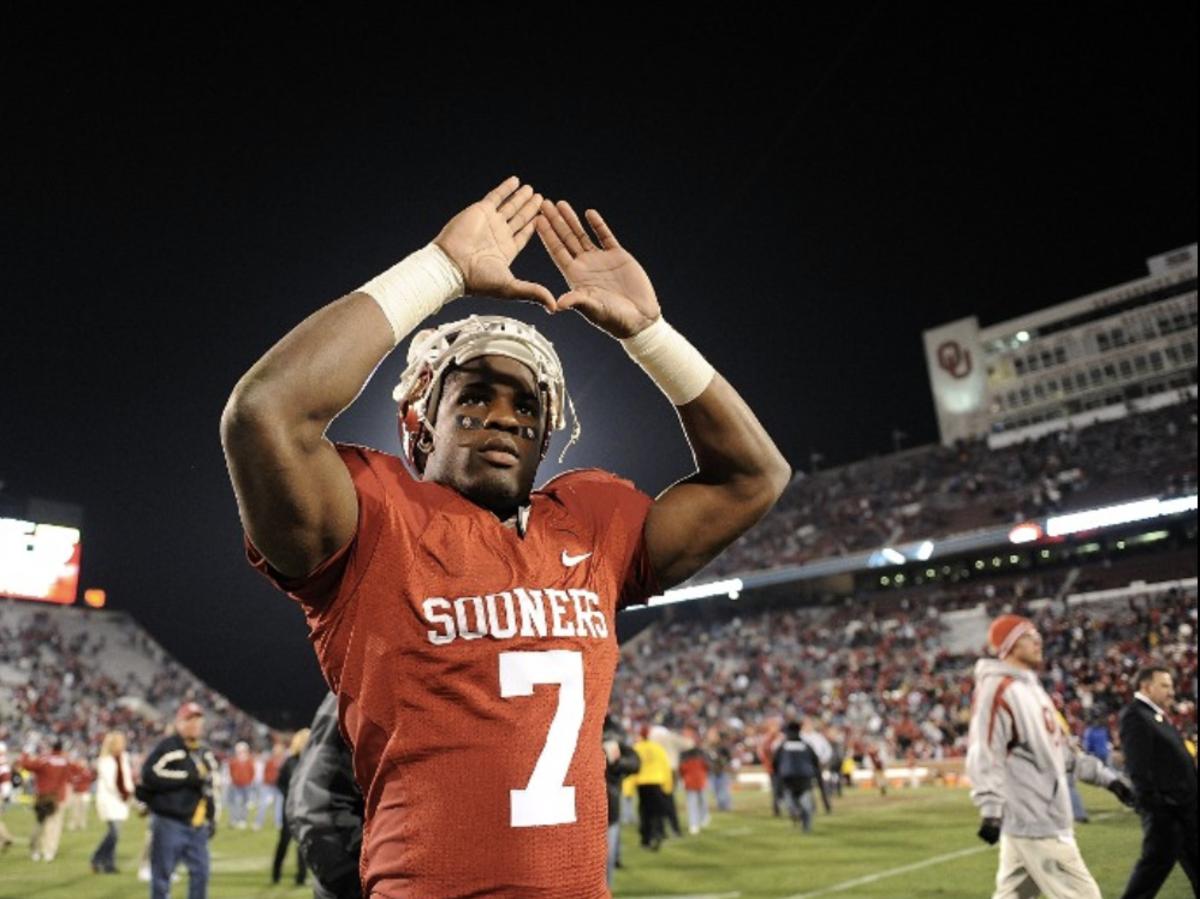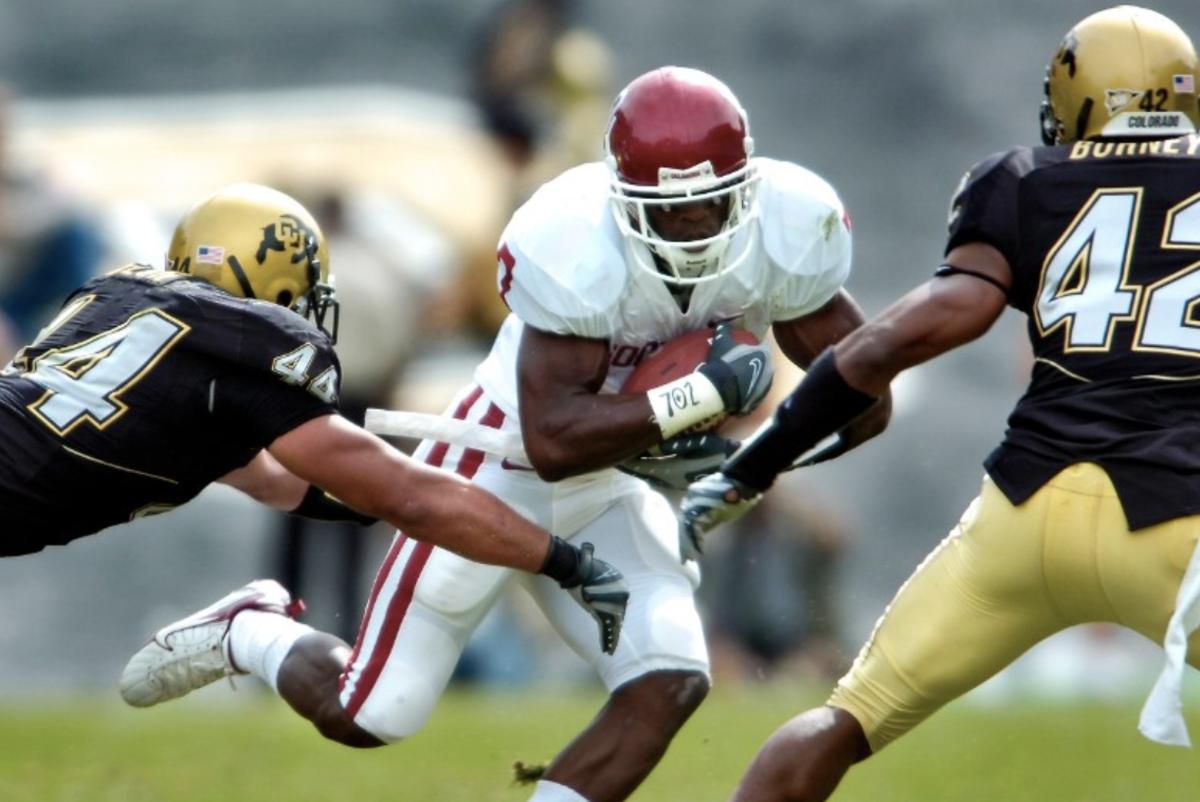Top 20 NFL Sooners, No. 4: DeMarco Murray
Top 20 NFL Sooners: No. 4 DeMarco Murray
In the past 20 years, the Oklahoma Sooners have experienced arguably their most productive era ever in the NFL Draft.
From the 2000 to 2019 drafts — the entirety of the Bob Stoops and Lincoln Riley years — OU has had 95 players drafted.
Using today’s 7-round comparison, that’s more than any other two-decade era in school history. In the 1970s and ‘80s, OU had 131 players drafted, but only 88 were selected in the first seven rounds.
In the last 20 years, the Sooners have produced some historically good players. Every day leading up to this year’s NFL Draft (April 23-25), SI Sooners presents the Top 20 NFL Sooners of the last 20 years.
———

The dust has settled. The smoke has cleared. Eleven years have passed since Oklahoma lost to Florida in the BCS National Championship Game.
The question on Sooner Nation’s mind during that decade-plus often feels more like a statement.
If DeMarco Murray had played in that game, rather than sitting out because of a torn hamstring tendon in his knee, would the Sooners have eight national championships instead of being perpetually stuck at seven? Would Bob Stoops have two crystal ball trophies instead of just one?
“Now that I’m not playing,” Murray said recently, “I guess I can say that.”
Murray ended his college career nine years ago now as, simply put, the most productive player in school history and one of the most versatile ever to play the college game. No Sooner accumulated more yards or scored more touchdowns.
So yeah, Murray gets a say when it comes time to speculate on whether his contributions might have made the difference in that 24-14 loss to the Gators.
You’d think that the player who ranks 12th in NCAA FBS history (fifth among Power 5 schools) with 65 touchdowns might be able to punch it in on four attempts from inside the 10. Or the player who ranks 21st all-time in all-purpose yards (ninth in Power 5) in all-purpose yards might have moved the football some in a handful of key moments against Florida’s powerful defense.
Consider that college football has been in motion for 150 years now, and Murray’s accomplishments seem even more remarkable.

“DeMarco’s biggest attribute is he’s so skillful at so many things,” coach Bob Stoops said in 2010 as Murray prepared for Senior Night activities against Oklahoma State. “He’s excellent running routes. He’s got great hands. He’s got speed out there when he does get the corner on somebody. He can run the football. He’s a great pass protector picking up blitzes. He’s so strong. He’s just versatile. He can do everything. And in an offense like ours, we take advantage of that. We like being able to do multiple things with him. He’s perfect for it.”
Murray played seven seasons in the NFL — all of them good, two of them great and one of them elite — before spending one year in the broadcast studio. Now, after coaching for Kevin Sumlin at Arizona in 2019, he’s back at his alma mater mentoring OU running backs in just his second season as a college football coach.
Murray redshirted the 2006 season after a preseason turf toe injury. He ran for 764 yards in 2007 before fracturing his kneecap trying to recover an onside kick in a loss at Texas Tech. He ran for 1,002 yards in 2008 as Oklahoma’s offense shattered NCAA records behind Heisman Trophy winner Sam Bradford and an all-pro offensive line. He ran for 705 yards in 2009 as the Sooner offense underwent a complete overhaul. And he set career highs with 1,214 rushing yards and 15 touchdowns in 2010.
That 2010 season, Murray also caught 71 passes for 594 yards and five more touchdowns. In his career, he caught 157 passes for 1,571 yards (10 yards per catch) and 13 TDs.
He also accumulated 1,462 yards and scored two touchdowns on kickoff returns — the only player in school history to go over 1,000 career yards rushing, receiving and returning.
On the day he was introduced as the Sooners’ new running backs coach, Murray was asked if any memories had come flooding back to him.
“Obviously, winning lots of championships and having fun,” Murray said. “Like I said, walking through these doors and seeing 85 percent familiar faces, that says a lot about this program, says a lot about the people, why they’ve been here so long.”
Murray was also asked if he feels any unfulfilled obligations to bring Sooner Nation that elusive national championship — now as a coach and recruiter.
“There’s a standard, obviously, being associated with this program and obviously Big 12 championship means a lot and playoff means a lot,” he said. “But the ultimate goal, why you come here and why you play here and why you coach here, is to be in the big one. And by no means do I take that lightly, and by no means does anyone in this program, that’s associated with this program, take it lightly. We know what our goals are.
“But at the same time, gotta take it one day at a time. Taking it one day at a time and working hard throughout the course of the week, throughout the course of offseason programs, mentally, physically, emotionally — it all plays a part.”

Murray said his football experience — whether it’s shattering school records with 6,718 all-purpose yards or 65 touchdowns, or winning the National Football League rushing title with 1,845 rushing yards in 2014 or leading the league with 2,281 all-purpose yards and 449 offensive touches — is “a factor” when it comes to recruiting the next generation of Sooner running backs.
“To a certain degree,” he said. “Obviously, we know what my history was, but that’s not something that I live on and approach it that way. I know there’s a lot that goes into recruiting and getting to know the families and getting to know that player on a deeper level, an emotional level that you have to connect with. So I think at a certain aspect. That’s not something I talk about or something I put out there or say, ‘Hey, this is who I am so you should give me an opportunity.’ That, to me, is sort of irrelevant. It takes a lot deeper path and emotional connection to get into it with these kids and their families.
“I think it's a factor. I was in their shoes 12 years ago. I was obviously playing 2 1/2 years ago. So I think that's a factor to some degree.”

Murray ran for 897, 663, 1,121 and 1,845 yards in his first four seasons with the Dallas Cowboys. Chip Kelly and Philadelphia acquired him in a trade, but Murray only ran for 702 yards with the Eagles in 2014. Tennessee acquired Murray, and he rushed for 1,287 yards and 659 yards before calling it a career in 2017.
In all, Murray was voted to the Pro Bowl three times, and his 2014 season was accorded first-team AP All-Pro recognition.

Murray grew up in Las Vegas and played at Bishop Gorman High School. He nearly signed with Pete Carroll and USC as a cornerback, but Cale Gundy and Bob Stoops offered him a chance to star at running back.
When Stoops swung by Gorman on a recruiting trip to visit linebacker Ryan Reynolds, then-coach David White took Stoops by the basketball gym. White shouted to Murray to show him something, so Murray, then a junior on the basketball team, bounced the ball off the floor, off the backboard and high into the air, where he snagged it and threw down a thunderous dunk.
Stoops offered Murray a scholarship on the spot, without even having evaluated his football film.
Whether it was hurdling over teammate Joe Jon Finley on his way to a 65-yard touchdown against Texas, or tip-toeing, spinning and somersaulting for a touchdown against Tulsa, or going cross-country against Baylor with a kickoff return, a swing pass or a handoff (he hit the Bears with long touchdowns via all three), Murray surpassed even the highest expectations.
Watch Murray’s extensive highlights and it may be hard to believe that most of his success came not from superior athletic ability, but from superior mental preparation.
“I’ve always been a coach in the room,” he said. “Even here, with the depth that we had here with Adrian (Peterson), Chris Brown, Mose (Mossis Madu) and all those guys. When I went to Dallas, same thing. I've always kind of been that guy. I've been a cerebral guy because I've known not just the running back position but what the offensive line is doing, what the tight ends are doing. I prided myself on knowing the entire offensive system, not just my job.”
Consider, too, that Murray’s seven NFL seasons were plenty. He had a very specific plan for his post-football career, so he was never going to be one of those players who hangs onto the glory too long as his body deteriorates.
Playing football, he said, took its toll. In 11 seasons in college and the pros, he accumulated 2,930 touches and 16,316 all-purpose yards.
But Murray, now 32, looks as fit and fresh as ever. Still, playing pro football wasn’t easy, even for a running back with three 1,000-yard seasons.
“It is hard,” Murray said. “But like I said, having a chance to come here — if I would have went anywhere else, not saying I wouldn’t have had the same career, but having a chance to be here and understanding what it really takes day in and day out from coach Stoops, Gundy and the rest of this staff and this program and the city of Norman, that helped me tremendously throughout the course of my career.”
To get the latest OU posts as they happen, join the SI Sooners Community by clicking “Follow” at the top right corner of the page (mobile users can click the notifications bell icon), and follow SI Sooners on Twitter @All_Sooners.
